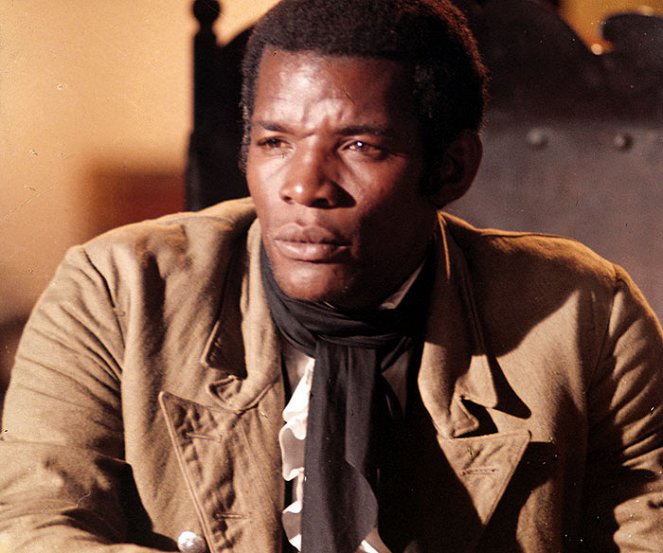Regie:
Gillo PontecorvoMusik:
Ennio MorriconeBesetzung:
Marlon Brando, Evaristo Márquez, Renato Salvatori, Giampiero Albertini, Carlo Palmucci, Dana Ghia, Cicely BrowneInhalte(1)
Sir William Walker kommt Mitte des 19. Jahrhunderts mit einem geheimen Auftrag der britischen Krone nach Queimada: Die Engländer wollen die Insel unter ihren Einfluss bringen, um anstelle der Portugiesen das Geschäft mit dem Zucker machen zu können. In José Dolores findet der britische Abenteurer einen Mann, der ihm für seine Pläne geeignet erscheint. Auf dem Umweg über einen Goldraub vermittelt er ihm revolutionäres Selbstbewusstsein. So wird José zum Anführer eines Aufstands, ohne zu ahnen, dass er nur ein Werkzeug des Briten und seiner Auftraggeber ist. Als Walker sein Ziel erreicht hat, verlässt er die Insel. Zehn Jahre später holt man ihn jedoch zurück, diesmal als Militärberater eines erfolglosen Generals, der mit Walkers Hilfe die um die Früchte ihres Kampfs gebrachten Guerilleros unter José Dolores vernichten will. (Verleiher-Text)
(mehr)Kritiken (5)
Marlon Brando in der Hauptrolle (als positiver Held? als ein negativer?) eines Films mit einem stets aktuellen Gedanken. Wenn die Mächtigen etwas wollen, werden sie es auch bekommen und es spielt keine Rolle, ob sie jemanden bestechen oder ob sie mit einem Fingerschnipsen, mit Versprechungen und falschen Hoffnungen eine Revolution und einen Krieg auslösen. Die Menschen sind für sie nur Spielfiguren. Aber Moment mal… Ist es wirklich so, ähm, schwarzweiß? Pontecorvos Regie zeigt Szenen wie den Banküberfall oder den Angriff auf das Dorf zunächst nicht, aber das ist nur gut so, weil wir die Kämpfe und das Sterben in der zweiten Hälfte in Hülle und Fülle "genießen“ können. Und es sind wirklich grauenhafte Szenen. Neben der ausgezeichneten Leistung von Brand ist natürlich auch die perfekte Musik von Ennio Morricone ein großer Pluspunkt.
()
Director Gillo Pontecorvo is known, among other things, for his documentary-style war drama, The Battle of Algiers, and he was one of the left-leaning filmmakers of his generation. Even in this case, he does not deny his political commitment. It does not make sense to consider Burn! a classic adventure spectacle set in the backdrop of an exotic Caribbean island. Pontecorvo directed a political drama, in which he deals with the much-debated topic of neocolonialism in Euro-American intellectual left circles in the 1960s, through the story of the strange alliance and subsequent conflict between British emissary William Walker and indigenous rebellion leader José Dolores. After World War II, European colonial empires quickly disintegrated, but former centers of power attempted to maintain their influence indirectly through supporting cooperative local leaders, corruption, and pressure. On the island of Queimada, controlled by the Portuguese, British agent Walker arrives with the aim of driving out the colonial rulers with the help of local residents and facilitating the penetration of British capital into the area. He selects a suitable leader for the popular uprising and provokes the local elites to declare independence. However, the abolition of slavery does not mean an improvement in the living conditions of ordinary people, and once ignited, the spirit of rebellion continues to burn within society. The character of William Walker is exceptionally well-written, ambiguous, complicated, and contradictory in his actions and goals. Walker is an excellent observer, analyst, and organizer, as well as a dangerous manipulator and cynical pragmatist who serves whoever pays him. But he is also a person who understands the difficult fate of the people "down there" and has no problem improving their position. Perhaps even by pushing the ruling class against the wall at the right moment. On the other hand, Dolores perfectly embodies the schematic ideas of a decisive and uncompromising revolutionary leader, as envisioned by supporters of Fidel Castro and the Cuban revolution. In the confrontation of these two characters, Gillo Pontecorvo predictably stands firmly with the popular leader. Unfortunately, practical experience derived from studying history speaks unequivocally in favor of opportunists like Walker. Reformers succeed, not saviors. They know how to destroy, but they cannot handle the role of negotiators, creators, and guarantors, often ending up as self-righteous authoritarians like Mugabe or desperate failures capable of dragging their surroundings down with them. Marlon Brando's performance as William Walker deserves attention and is one of the most interesting roles in his long and extensive career. Overall impression: 65%.
()
Genius puppet master Brando changes the history of the island of Queimada before our very eyes. His captivating acting performance and the never-forgotten theme of revolution form the foundations of the entire movie. José Dolores is Walker’s adept ally and enemy in one and their final meeting is simply breathtaking. Perfect acting. Overall this picture is pretty dated and lots of battles take place somehow in the background, but this doesn’t make it any less powerful.
()
If you've ever wanted to make your own revolution, here are clear instructions how to do it. And what will you need? Charisma, scheming talents, eloquence, cynicism and, above all, the ability, under all circumstances, to keep the pragmatic perspective of someone who takes all these lofty speeches, ideas, oppression, slavery, class differences, human destinies, death, and violence in such a way that they exist only to be taken advantage of. It's hard to say whether it is the best, but in any case, it’s the most interesting and most ambiguous role of Brando's career, which is richer than any other in interesting and ambiguous characters. Today, this would be a blockbuster film about a black leader who leads his people to freedom; at the time of its creation, most filmmakers would have settled for a classic left-leaning revolutionary film about a hero of the people; but not Pontecorvo, who (again) was miles ahead of (not only) his time.
()


Werbung